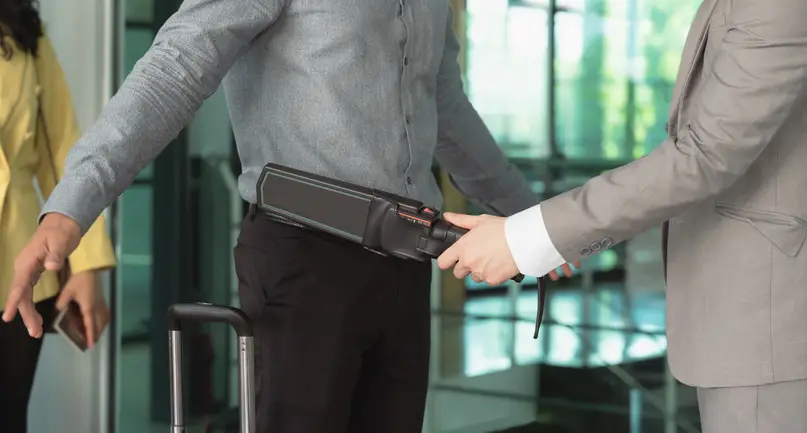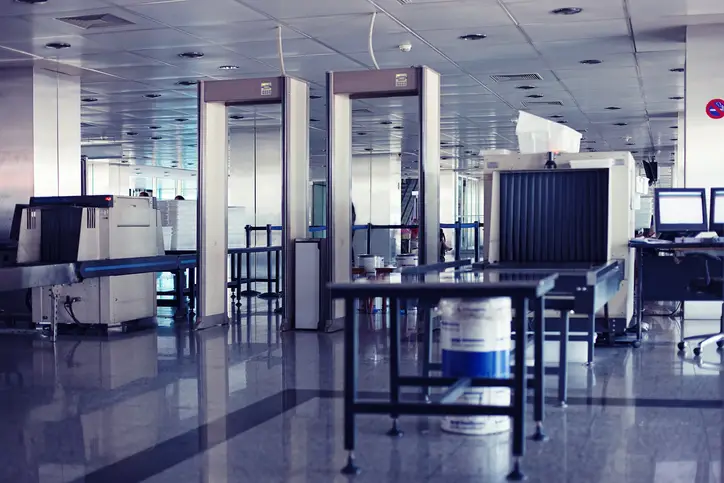At a glance:
| FAQ | Answer |
|---|---|
| Can I travel with a metal implant? | Yes. Most people can travel safely once they’ve recovered from surgery. |
| When can I travel after surgery? | Most doctors recommend waiting 6–12 weeks after surgery to let your body heal. You may need a fit-to-fly certificate. |
| Do metal implants set off security alarms? | Larger implants can trigger detectors, but staff handle this every day. |
| Can metal implants/medical devices go through scanners? | – Joint replacements: Generally safe, may trigger alarms. – Pacemakers: Safe in millimetre-wave scanners. Walk steadily through metal detectors; avoid handheld wands held over the chest. – Insulin pumps/CGMs: Avoid all scanners. – Cochlear implants: Generally safe; external parts may alarm. |
| What should I tell airport staff? | Mention your implant before screening. If it sets off alarms, explain and ask for a private check if you prefer. |
| Do I need to tell my travel insurer? | Yes, if surgery was in the last 2 years, or if you have related symptoms or conditions. |
You’ve done the recovery, you’re back to feeling more like yourself, and now you’re thinking about getting away again – but what about your metal implant? How will the security checks work? Will you set off any alarms?
The good news is, many people with hip, knee and heart implants travel often and comfortably. With a few simple steps and a little preparation, you can feel ready for take-off and focus on the best part of travel: where it takes you next.
Can I travel with a metal implant?
From hip and knee replacements to pacemakers, pins and plates, metal implants help millions of people stay active and keep doing what they love, including travelling.
Once you’ve recovered from surgery or treatment, you can usually travel as before. Most implants are made from strong, non-magnetic materials such as titanium or surgical-grade stainless steel, designed to stay stable in everyday environments, including airport scanners and aircraft cabins.
That said, some screening equipment can still detect these metals, which means your implant might occasionally trigger an alarm.
Travelling after metal implant surgery
For many metal implant surgeries, doctors recommend waiting at least 6 weeks before taking a trip. This gives your body time to heal and lowers the risk of swelling or deep vein thrombosis (DVT) on longer flights.
Some orthopaedic specialists, such as Dr James McLean, advise waiting up to 3 months after major operations like hip or knee replacements. This allows time for strength and mobility to return, making it easier to sit comfortably and move around the cabin. Always check with your GP or surgeon before booking to confirm what’s right for you.
If your operation was recent, your airline may ask for a fit-to-travel certificate confirming that you’re ready to go.
Do metal implants set off airport scanner alarms?
Sometimes they can, but it’s usually nothing to worry about. The scanners used in UK airports are designed to detect metal without affecting it. Most use the following types:
- Walk-through metal detectors, which detect metal objects on the body. These can sometimes be triggered by implants made of titanium, stainless steel or cobalt-chrome alloys.
- Full-body scanners, which use safe millimetre-wave technology to create a simple outline of your body, so staff can check for anything unusual without seeing any personal detail. These scanners don’t use X-rays, and don’t interfere with medical devices.
What to tell airport security staff when you have a metal implant
Letting staff know about your implant early can help things run more smoothly and avoid confusion if an alarm sounds. We recommend:
- At the checkpoint: when you reach the front of the queue, tell the officer that you have a medical implant.
- If the detector alarms: pause and mention your implant again if needed – they’ll guide you through the next step.
- Secondary check: a short handheld scan or light pat-down is common. You can ask for a private room and have a companion with you.
Top tip: a doctor’s letter or device ID card isn’t usually needed, but can help explain the situation quickly.
Guidance for different implant types
Joint replacements and orthopaedic implants (titanium, cobalt-chrome, stainless steel)
Most hip, knee and shoulder replacements are made from non-magnetic metals, which are safe in all airport scanners.
Larger implants can sometimes trigger metal detectors, especially when present in the lower body. Security staff encounter this every day and can complete checks in minutes.
Pacemakers and implanted cardiac defibrillators (ICDs)
When you reach security, show your manufacturer’s card and let staff know you have a cardiac device. They’ll explain what to expect and guide you through the walk-through metal detector without stopping, as standing still inside the archway for too long can occasionally confuse how your device reads signals.
Security officers are trained to avoid using handheld wands directly over your chest and may carry out a short manual check instead if needed.
Full-body millimetre-wave scanners are considered safe for pacemakers and ICDs, but you can ask for a manual search if you’d prefer not to use one.
Insulin pumps and continuous glucose monitors (CGMs)
According to Diabetes UK, not all diabetes technology can safely go through airport security checks. Most insulin pumps and continuous glucose monitors (including Freestyle Libre sensors) can be worn through walk-through metal detector arches, but they shouldn’t go through X-ray luggage scanners or full-body scanners.
If you prefer not to remove your device, you can ask for a pat down instead. This may take a little longer, as a trained staff member will usually need to carry out the check, so allow extra time when you travel.
Cochlear implants and hearing devices
According to Oxford University Hospitals NHS Foundation Trust, airport metal detectors and scanners won’t damage your cochlear implant or sound processor, but they can occasionally trigger an alarm. If that happens, staff may use a handheld scanning wand. It won’t affect your implant, but it might beep when passing over the sound processor.
You may also notice a brief distorted sound from the scanner’s magnetic field. Turning the processor volume down, or switching it off before screening, can help prevent this from feeling too loud or uncomfortable.
Dental work, plates and other surgical metalwork
Dental fillings, crowns, and small surgical plates or screws rarely trigger airport scanners. If you’re ever asked, a simple explanation that you’ve had minor surgical metalwork is usually all that’s needed.
What about cruises, ports or theme parks?
Cruise terminals, ferry ports and large attractions often use the same walk-through detectors as airports. The same approach generally applies: tell staff early, carry documentation, and request a private check if you prefer.
How to get an implant identification card
Implant identification cards explain what device you have, where it’s fitted, and which materials it contains, helping staff understand why a scanner may detect metal.
You’ll usually be given an ID card by your hospital or specialist clinic after surgery. If you didn’t receive one, or it’s been misplaced, contact your consultant’s secretary or hospital department. They can issue a replacement.
What to tell your travel insurer
If you’ve had surgery or a metal implant, it’s important to declare it when getting your travel insurance quote. This will help make sure your cover reflects your current health.
With Avanti, you’ll be asked about any surgery, hospital stays or ongoing medical treatment in the last 2 years. You’ll only need to declare your implant if it’s linked to a recent procedure or if you’re still having follow-up appointments or physiotherapy.
When completing your medical screening, be sure to declare any related condition, such as arthritis or osteoporosis.
Get travel insurance for joint replacements, pacemakers and more
If you’re travelling with a medical implant, whether it’s a pacemaker, hip replacement or surgical plate, Avanti can help. Our travel insurance covers over 1,300 pre-existing medical conditions*, including many related to surgery or ongoing treatment, subject to medical screening.
Depending on the policy you choose, you could get up to £7,500 in cancellation cover on Deluxe policies and access to 24-hour medical support if you fall ill abroad. You’ll also be covered if a health-related issue means you need to cut your trip short or receive emergency treatment while away.
*See policy documents for full details.



